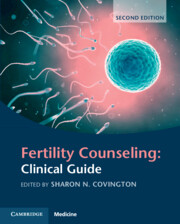Book contents
- Fertility Counseling: Clinical Guide
- Fertility Counseling: Clinical Guide
- Copyright page
- Dedication
- Contents
- Preface
- Contributors
- I Introduction
- II Therapeutic Approaches
- III Third Party Reproduction: Assessment and Preparation
- IV Addressing the Needs of Diverse Populations
- V Special Topics in Fertility Counseling
- Chapter 19 Resilience in Reproductive Loss
- Chapter 20 Reproductive Trauma and PTSD: On the Battlefield of Fertility Counseling
- Chapter 21 Pregnancy Loss Counseling
- Chapter 22 “A Little Bit Pregnant”: Counseling for Recurrent Pregnancy Loss
- Chapter 23 Pregnancy and Postpartum Adjustment in Fertility Counseling
- Chapter 24 Walking the Tightrope: The Pregnant Fertility Counselor
- VI Practice Issues
- The International Glossary on Infertility and Fertility Care, 2017
- Index
- References
Chapter 19 - Resilience in Reproductive Loss
from V - Special Topics in Fertility Counseling
Published online by Cambridge University Press: 24 November 2022
- Fertility Counseling: Clinical Guide
- Fertility Counseling: Clinical Guide
- Copyright page
- Dedication
- Contents
- Preface
- Contributors
- I Introduction
- II Therapeutic Approaches
- III Third Party Reproduction: Assessment and Preparation
- IV Addressing the Needs of Diverse Populations
- V Special Topics in Fertility Counseling
- Chapter 19 Resilience in Reproductive Loss
- Chapter 20 Reproductive Trauma and PTSD: On the Battlefield of Fertility Counseling
- Chapter 21 Pregnancy Loss Counseling
- Chapter 22 “A Little Bit Pregnant”: Counseling for Recurrent Pregnancy Loss
- Chapter 23 Pregnancy and Postpartum Adjustment in Fertility Counseling
- Chapter 24 Walking the Tightrope: The Pregnant Fertility Counselor
- VI Practice Issues
- The International Glossary on Infertility and Fertility Care, 2017
- Index
- References
Summary
Fertility counselors see an array of clients who may be diverse in terms of countries of origin, ethnicity, race and/or cultural background. This chapter identifies principles to guide this conversation. These principles include understanding how we consider race, ethnicity and culture, and emphasize the importance of not essentializing race, ethnicity and culture. The chapter continues with a brief overview of the meaning and consequences of infertility in various places worldwide and among migrant and racial minorities in particular, how this can affect access to, use of and experiences with fertility treatments and assisted reproductive technologies (ARTs). Finally, we offer considerations for racially and culturally sensitive clinical approaches in fertility counseling.
- Type
- Chapter
- Information
- Fertility Counseling: Clinical Guide , pp. 195 - 203Publisher: Cambridge University PressPrint publication year: 2022



